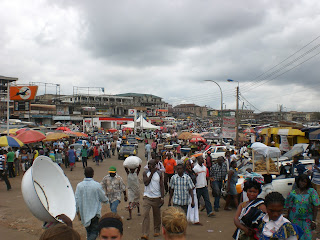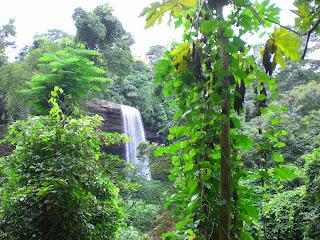I'm staying in Ghana!
After many arduous walks to the International Programmes Office to the Registry and up and down and back again (there are many hills on campus), I had fought myself through, how shall I put it, a bureaucratic nightmare and I finally received the admission for my second semester in Ghana! I am going to do research for my BA-thesis on campus and can start with my thesis here, until I go back to the German summer semester. It didn't actually take me long to work out that I didn't want leave Ghana but then the first semester went by sooo fast and now most of the other international students have already left and gone home to the US, Nigeria, Germany, Norway, etc. My four friends from Giessen are still around but will all be gone in January. Now that everyone is leaving I realize how many things I still want to learn, say, see, cook, or simply how glad I am to be here until May. My German sister and my Australian (host-)sister (in Ghana they'll call us sisters) are visiting me in January and I can't wait to show them around some parts of Ghana, Accra and introduce them to my „Ghanaian campus life“.
Togo, Lomé
Two weeks ago, we, the five Germans, went to Ghana's neighbouring country Togo.
 |
| Beach in Lomé |
I was slightly concerned about security, especially when we had to cross the border in the dark with all our belongings and find our hotel. Everything ended up well, we did not get mugged by a motorbike gang (that's what the German Embassy warns to watch out for) but decided to spend our evenings at the hotel anyway. The first full day in Togo was a nice change from Ghana, mostly regarding the food.
 |
| French influence - even in Ghana's bordertown Aflao |
There is coffee, espresso, baguette (sold in the market with avocado and omelette, yum), and our hotel (La Galion) served delicious French-influenced food (froglegs). We could all try our fair share in speaking French – although Paula, our native-like French speaker probably enjoyed it most. The market in Lomé seemed to be pretty much like the Ghanaian markets we've seen, apart from the Fetish market probably. We didn't go there because it seemed verys overpriced (like everything in Togo from our point of view) and weren't sure whether we even wanted to see dead animals.
 |
| Motorbikes, everywhere we looked |
On the second day, after we'd had enough of walking through Togo's capital Lomé, we visited Lake Togo and Togoville. After some troubles finding a vehicle, since trotros practically don't exist in Togo, at least we didn't see a single one, we hired a taxi to the lake, then paid again for the boat across the lake, then paid the sweating guys who carried us to the shore, then paid a „guide“ from the „tourist association“ of Togoville because apparently you can't walk around by yourself.
 |
| Full shot: Togoville from the lake |
 |
| Close-up: Togoville |
 |
| Smiley faces |
The guide stated the obvious („That's the church and you can read the sign if you want to know more about it“), showed us Vodoo trees and -monuments. When I asked what the money earned by the tourist association is used for, he said „Cleaning the village“. -Seeing how dirty the village was, there was plastic lying around EVERYWHERE, I asked „When?“. - Him: „In three months“ - Me: „Who cleans the village?“ Him: „The kids“. - Me: „Do the kids get any money?“. The answer was negative. After being told that the German Embassy in Togo supports the village financially, too (maybe to pay off some debt from colonial times when the Germans were ruling over Togoland), I left the place behind with very mixed feelings, this time we walked to the boat ourselves, as not having to pay some guys who believe they can earn money by carrying tourists off a boat (future perspective, hey). An hour later, back in Lomé, we packed our bags, had another baguette for lunch and walked back across the border to Ghana. The first thing I heard was a Ghanaian welcoming a friend „Chalee, ah dey, welcome to Ghana“. And then some guy on the radio welcomed us in Twi „Akwaaba bio – Welcome back“. What a lovely sound in my ears!
 |
| Akwaaba bio! Back on the road in Ghana. |
 |
| Sunset between Aflao and Accra |
After finding a trotro from Aflao to Accra within a minute (cheers for Ghana's well-organized transport system!), we were all happy and could not stop talking about how great it was to be back in Ghana despite the short time we'd been away. No doubt, I love Ghana. Julia and I had some fun in the front seats as our car got stopped at every police barrier on the way. Each time, one or two army men would walk around the car, inspect Julia and me more or less obvious, greet the driver and let him drive away. The last one shouted „You are arrested, you five [pointing at us Obronis]!“ but he could conceal his grin as little as we could, so the journey went on.
After Togo, we realized how much we had gotten accustomed to Ghana's reliable transport system, low prices, our bargaining power (bargaining taxis is somewhat not as common in Togo), and genuine people. Bribing in Togo is also expensive and apart from that, it seemed like everyone tried to get money out of us for every little thing. But mind you, that's the impression we got after two days in the capital, I suppose if we had stayed longer and seen the inland, our experiences might have been slightly different.
Harmattan – Dry Season has started
The weather has changed a little in December – it is getting drier and a little colder. That is, us Germans sweat a little less, whereas some (luckily only some) Ghanaians walk around in wollen jumpers. It does cool off a little at night and it is possible to train until 8am without dying in the heat. Moreover, Harmattan winds carry desert sand from the Sahara across to West Africa (or something like that). A strange kind of fog was hanging above Accra in the past two weeks, it is the opposite of cold damp fog, basically, it is a dry and warm layer of dust. I thought it must be smog, first, but it was visible everywhere, not only above the city. The sunrise and sunset couldn't be seen well anymore as the sun set into the dusty fog about half an hour before it is actually gone. The dustcloud has gone a little but it hasn't rained in a while and is not supposed to do so anytime soon. According to Wikipedia, the humidity level during Harmattan can drop to as low as 15%...I have already stocket up on 50 pesewas clumps of raw shea butter at Tema Station, and made the interesting observation that our door in the hostel is not screeching any more and that the bathroom doors actually close – the wood must've shrunk in the dry.
When the sun doesn't shine as much on one day, it sometimes makes me want to snuggle up and drink a warm cup of tea or milo and somehow the change of the weather reminds me a tiny little bit of …
...Christmas!
Yes, it does exist here, too, but is not such a big hype as in Europe, etc. I've been quite happy without any of the pre-christmas stress and the cold and dark times I always have to get used to in Germany. The well-known christmas songs (e.g. „Let it snow“), plastic christmas trees and the odd christmas lights on some of the hotels keep reminding me of the commercial hype back home – which I definitely do not miss. It always seems somewhat unreal to me, when I walk the rocky dusty path to the bushcanteen to buy grilled plantain and hear a well-known christmas song, blaring out of the loudspeaker (there is hardly such a thing as quiet music here), or when I sit at the central cafeteria, inmidst of all the other sportspeople who've just finished the morning training, eating rice porride for breakfast, and the radio is playing christmas tunes. I love it.
I am currently training with the sportswomen and -men from UG who are going on yet another Inter-University Competition in January. Every morning from 5:30am and in the afternoon at 3pm the quiet campus -vacation has started- comes back to live and you'd see people running, hurdling, jumping, playing, throwing, singing, sweating --- the vibe is great! Although I'm not joining the competition, I took the chance to train with the other athletes. My muscles have rarely been as sore as now and I noticed how time-consuming 5hrs training are but I love the exercise and wouldn't really mind doing it over christmas. However, I'm going to spend the three christmas days in an ecolodge at a beach in Ghana's Western Region with my German buddies Julia and Paula and her Canadian sister. No pressies, no pressure, no snow, I'm really looking forward to it. I might miss the christmas eve cooking with my family a little, but thanks to Airtel I can make really cheap calls home and will be in touch with my loved ones.
 |
| Merry Christmas :) |
Speaking of loved ones, I wish you all a
Merry Christmas and a Happy New Year!
Afenhyia pa!
Frohe Weihnachten und ein Frohes Jahr 2012!
Ah de wish u merry christmas and a happy new year! (Just in case christmas greetings exist in Pidgin, too :)




























